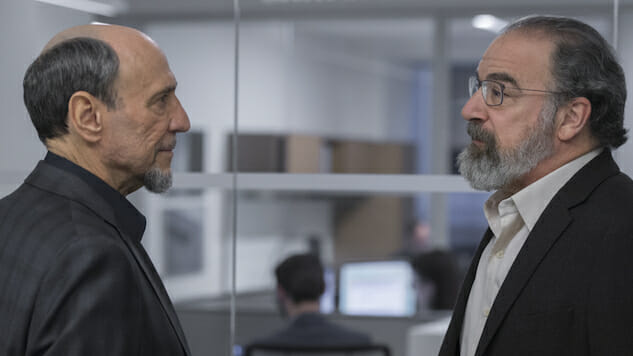Homeland: Past Is Prologue
(Episode 6.07)
JoJo Whilden/SHOWTIME
Though it’s there, shadowing the characters, from the episode’s first sequence—in which Quinn (Rupert Friend) awakens, disoriented, in a wood-paneled bedroom, and pleads with Astrid (Nina Hoss) not to let him forget—I failed to see the subtext of “Imminent Risk” until the narrative had run its course, as Saul (Mandy Patinkin) and Carrie (Claire Danes) slip into patterns of Homeland seasons past. To see the latter reach for the bottle, or to hear the former’s interlocutor “send greetings from Sergeant Brody,” is to be reminded, as I wrote of “A Flash of Light,” that we’re in the midst of the series’ most self-conscious interlude: Not since Season Four’s “Redux,” in which Carrie hallucinates her former lover into being, has Homeland cast its foregoing narrative in such an unforgiving light. I say this as a way of admitting that “Imminent Risk,” on its face, is the season’s weakest entry, cheapened by its maudlin interest in Carrie’s home life; the “revelation” that Dar Adal (F. Murray Abraham) is pulling the strings, for instance, is predictable in the extreme. And yet, by the time I felt my skin crawl at Carrie’s downward spiral— “You lost a child,” she says to President-elect Keane (Elizabeth Marvel), finally crossing the line —I found myself wondering if “Imminent Risk” might, beneath the surface, be the season’s most ingenious, laced with intimations of unshakable regret.
Reading the episode as a return to an earlier constellation of plot points and character traits—Carrie coming undone, Saul collaborating with Javadi (Shaun Toub), Adal playing Quinn’s frailties like a fiddle—reframes the “risk” of the title, that which Carrie poses to her daughter, as the result of deeper, wider wounds; here, the personal and the political alike reflect histories that reach much further into the past than the latest internecine conflict or terrorist attack. This isn’t to say that the intervention of the Administration for Children’s Services (ACS) isn’t infuriating, even exploitative, a second-rate narrative device masquerading as an emotional one. Rather, it’s to suggest that Carrie’s wrangling with the ACS official (played with unnerving calm by Marin Hinkle) reflects the main thrust of “Imminent Risk,” and indeed the season entire, which is to underline Faulkner’s famed adage: “The past is never dead. It’s not even past.”
Adal knows this. The pressure he applies to Carrie, Quinn and Saul stems, in each case, from earlier events, the scars from which remain visible, raw, months or years later. Homeland knows it, too: “Imminent Risk,” written by Ron Nyswaner and directed by Tucker Gates, contains a raft of allusions to the series’ own history, from the reference to Brody and Carrie’s “manic episode” to “the whole story” of Quinn’s injuries. (“You think she’s been taking care of you all these months out of love?” Adal says on the dock, manipulatively, tellingly, near the episode’s end. “Sounds a lot more like guilt, if you ask me.”) Saul’s “debrief”—or is it an interrogation?—calls to mind other exchanges, in other rooms; he’s been questioned by his own people before, in both Season Five and Season One. Carrie’s swift reversals, from incredulousness to rage to tearful pleading, reminded me of nothing so much as a long-ago conversation, one I wrote about in 2012: